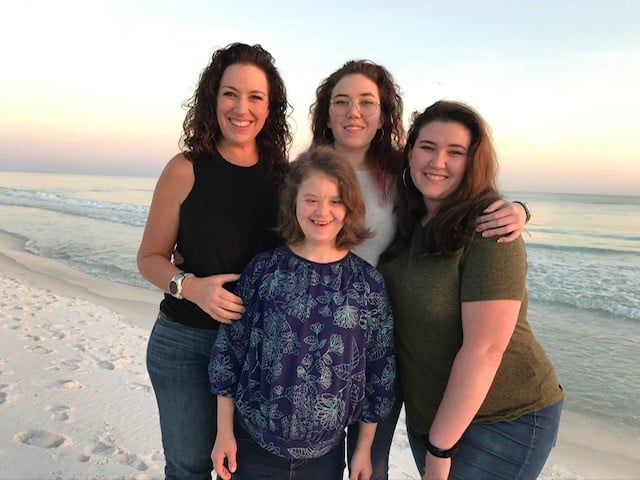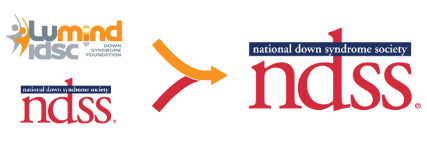September 7, 2021
RUNNING FOR RESEARCH:
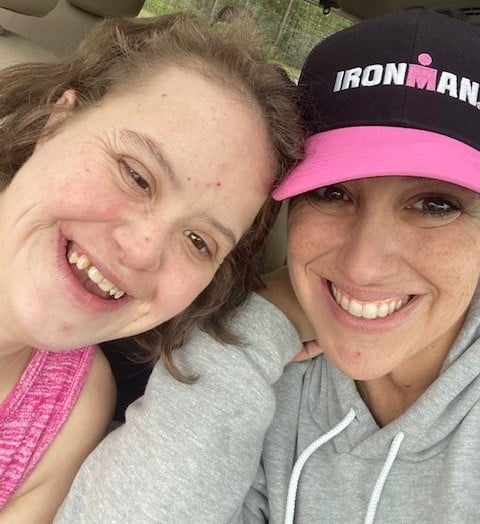 Good natured and modest, Michelle Sullivan does not consider herself an athlete. Not even with the three marathons and ironman races already under her belt. This mother of four is about to embark on her fourth and fifth marathons, both within weeks of each other. In October, Michelle is running the Chicago Marathon while also fundraising and training for the New York Marathon in November to support LuMind IDSC’s mission.
Good natured and modest, Michelle Sullivan does not consider herself an athlete. Not even with the three marathons and ironman races already under her belt. This mother of four is about to embark on her fourth and fifth marathons, both within weeks of each other. In October, Michelle is running the Chicago Marathon while also fundraising and training for the New York Marathon in November to support LuMind IDSC’s mission.
Michelle has been running competitively for the past 11 years. “It started as a hobby to get out of the house and set a good example for my kids,” she said. Michelle soon realized that she could invest that energy and drive into something that could help her daughter Brittany, and the generations of people with Down syndrome who will benefit from research.
The athletic genes run in her family: “I have twin daughters in college who are competitive swimmers and my eldest daughter Brittany, 29 years old, who has Down syndrome, also practices sports and often rides a bicycle as I run and train for the marathons. My youngest son also enjoys playing sports.” In normal times, Brittany is part of the Special Olympics in their community in Florida, but for now the family has managed to practice yoga together and keep moving during the pandemic.
MICHELLE’S GROWING CONCERN OF ALZHEIMER’S DISEASE:
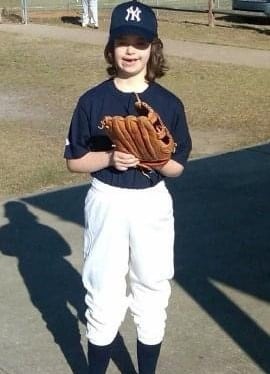 Ever since Brittany was a child, Michelle used to devour all the literature she could get her hands on, which, before the internet, was difficult to source. She tried to learn about the science, what was being done, and ways in which her participation could help advance the research and benefit Brittany. She then became interested in the link between Alzheimer’s disease and Down syndrome, which increased her concern for Brittany’s future: “the potential that she’ll develop it or that her life will be cut shorter or be diminished because of it. I want to know if there is a cure for it. I want to know what to expect; what’s going to happen. Right now, I don’t know what to expect, I don’t know what her life is going to look like. I want to know if she’ll live to be 100, I don’t even know that about myself, but I need the certainty that she’ll be okay. “
Ever since Brittany was a child, Michelle used to devour all the literature she could get her hands on, which, before the internet, was difficult to source. She tried to learn about the science, what was being done, and ways in which her participation could help advance the research and benefit Brittany. She then became interested in the link between Alzheimer’s disease and Down syndrome, which increased her concern for Brittany’s future: “the potential that she’ll develop it or that her life will be cut shorter or be diminished because of it. I want to know if there is a cure for it. I want to know what to expect; what’s going to happen. Right now, I don’t know what to expect, I don’t know what her life is going to look like. I want to know if she’ll live to be 100, I don’t even know that about myself, but I need the certainty that she’ll be okay. “
Michelle has had the bleak experience of witnessing her grandmother vanish into the fog of Alzheimer’s disease. “She was a healthy woman with nothing else fighting against her, and I watched her suffer. I just think: Brittany has had enough! You fight for every single bit of happiness and normalcy for your child.”
SETTING THE FOUNDATION FOR FUTURE GENERATIONS:
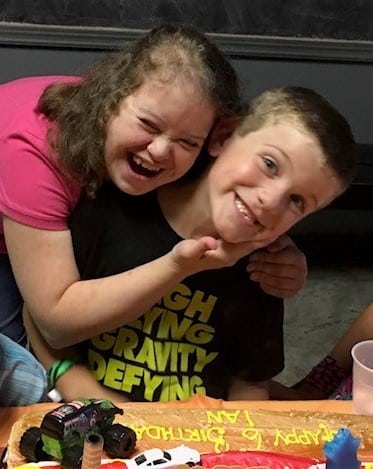 Michelle is one of many moms who speak from the voice of experience. She has “been there,” she’s is one of the pioneering parents who broke barriers and helped their kids overcome obstacles. Today, she has a poignant self-awareness that all she and Brittany are doing now might not benefit her own child, or even her generation. But in a hauntingly moving moment she explained her reasoning: “any research right now might not help us immediately, but you’re always looking to benefit and further the next person. I want that next generation, those moms, and dads to not know about any of the hardships that we may have battled. I already see that, I battled for inclusion, I battled for my daughter to be in a regular class with regular kids and I battled the “don’t use the R word”. We didn’t have campaigns, we didn’t have slogans, no hashtags, we barely had dial up internet. There was nothing, no cross-country community. It was local and you had to be loud, and you had to make it better for the next person because you don’t want that next mom to come through and say, ‘I had to work so hard to put my child with her peers.’ You want them to be able to walk in and register and that’s it, there’s no questions, no fights. I guess I’ve always been fighting for my daughter but also for that next generation, for them to have it a little bit easier. And I think every parent before me did the same thing. We no longer send our children to institutions. They no longer have a life expectancy of twenty. They get married, they have lives, they are happy. They are participants in everyday activities, and they are members of our community, and we shouldn’t look at them any different than anybody else. If the research you do now, the fundraising I do now benefits that next generation, why not do it?”
Michelle is one of many moms who speak from the voice of experience. She has “been there,” she’s is one of the pioneering parents who broke barriers and helped their kids overcome obstacles. Today, she has a poignant self-awareness that all she and Brittany are doing now might not benefit her own child, or even her generation. But in a hauntingly moving moment she explained her reasoning: “any research right now might not help us immediately, but you’re always looking to benefit and further the next person. I want that next generation, those moms, and dads to not know about any of the hardships that we may have battled. I already see that, I battled for inclusion, I battled for my daughter to be in a regular class with regular kids and I battled the “don’t use the R word”. We didn’t have campaigns, we didn’t have slogans, no hashtags, we barely had dial up internet. There was nothing, no cross-country community. It was local and you had to be loud, and you had to make it better for the next person because you don’t want that next mom to come through and say, ‘I had to work so hard to put my child with her peers.’ You want them to be able to walk in and register and that’s it, there’s no questions, no fights. I guess I’ve always been fighting for my daughter but also for that next generation, for them to have it a little bit easier. And I think every parent before me did the same thing. We no longer send our children to institutions. They no longer have a life expectancy of twenty. They get married, they have lives, they are happy. They are participants in everyday activities, and they are members of our community, and we shouldn’t look at them any different than anybody else. If the research you do now, the fundraising I do now benefits that next generation, why not do it?”
Michelle and her family know the only way the Down syndrome community can move forward and substantially improve the health and long-term well-being of people with Down syndrome is to band together and get involved. Reading, becoming curious about the future of research, and continuing to be loud in our communities will help us get there. Idleness is the enemy of every great endeavor, and we can’t afford to stay quiet. Michelle Sullivan won’t stay quiet – she will continue to be loud for her child, and for others.
“When someone told me ‘Brittany can’t do that, don’t you know that she has Down syndrome?’ I’d turn around and say: ‘yes she can! Get out of our way, we’re going to figure it out!’.”
Ready to get involved, interested in donating to our mission to make the lives of people with Down syndrome healthier, or simply curious about what’s happening in the scientific world?
To donate to Michelle Sullivan’s fundraiser, click here!
